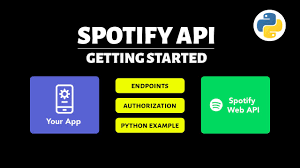Spotify's API Changes: What’s Really Going On?
Spotify has long been a powerhouse in the music streaming world, not only because of its massive catalog but also due to its once-open API ecosystem. Independent developers, startups, and AI music recommendation services have relied on Spotify's Web API to power personalized playlists, user listening insights, and smart integrations.
But in 2025, things are shifting dramatically. Spotify has begun tightening access to its API, restricting usage that once fueled third-party AI-powered tools. For companies that use Spotify’s API to develop music discovery engines, playlist builders, or AI DJ companions, this change is more than a tweak—it’s a seismic disruption.

Why Spotify’s API Is So Crucial to AI Music Tools
The Spotify API isn’t just a convenience; it’s the backbone of many AI music recommendation apps. Services like Soundtrack Your Brand, Boomy, and smaller AI projects often depend on Spotify’s user listening data, track metadata, audio features (such as tempo, energy, valence), and user preferences to build tailored recommendations or dynamic playlists.
Key features that were commonly used by developers include:
Get User's Top Tracks and Artists– for taste profiling.Get Recommendations Based on Seeds– for creating similar-song recommendations.Get Audio Features for a Track– for training AI models to understand music moods.
With limited access or stricter rate-limiting in place, many of these functionalities are now either throttled, paywalled, or inaccessible to apps without formal approval from Spotify.
How These Changes Hurt AI Music Recommendation Services
Spotify’s new API policies are designed to prioritize platform security, user data protection, and internal monetization strategies. But for AI developers, this shift feels like a closed door. Here's why it matters:
Loss of Personalization: Without access to user listening history, AI music tools can’t tailor recommendations as effectively.
Stifled Innovation: Startups and indie developers may no longer have access to the data needed to train or validate AI models.
Dependence on Spotify’s In-House Algorithms: Spotify becomes the sole gatekeeper of recommendation logic, limiting diversity in the music discovery landscape.
Revenue Impact: Apps that relied on Spotify API to attract paying users or advertisers may face revenue drops due to reduced functionality.
As a result, apps like Moises, Endlesss, and others exploring AI-generated music or hybrid recommendation workflows must adapt quickly—or risk obsolescence.
A Silver Lining: Opportunities Amid Disruption
While Spotify’s restrictions are undeniably a blow, they’re also pushing the AI music ecosystem to think beyond traditional integrations.
1. Alternative Data Sources
Services like Last.fm, Deezer, and YouTube Music still offer relatively open APIs. Developers can pivot to these platforms to continue offering recommendation-based experiences, albeit with a smaller footprint.
2. User-Generated Content (UGC)
New AI tools can learn directly from user-submitted audio files, mood tags, or manual curation. For example, platforms like Endel and Aimi.fm blend AI-generated soundscapes with user mood input without requiring Spotify integration.
3. Local-first Recommendations
Some AI music tools are moving toward edge processing—using downloaded music libraries, local play history, and device-level learning models (like Apple’s Core ML) to generate smart recommendations independent of external APIs.
4. Community-Driven Curation
Curated playlists via Reddit, Discord, or niche forums are making a comeback. AI tools that analyze these grassroots sources can still offer rich, human-validated recommendations.
Why Spotify Is Doing This (And What It Wants)
Spotify isn’t acting randomly. The company is:
Trying to retain control over user engagement and monetization.
Moving toward premium API tiers that may favor enterprise clients.
Looking to consolidate its ecosystem around proprietary features like AI DJ, Smart Shuffle, and personalized mixes—keeping users within Spotify-owned experiences.
Spotify’s AI features, powered in part by OpenAI technology, are now exclusive and refined. By limiting third-party API access, Spotify reduces competition for its own tools and increases the value of in-app engagement.
What Should Developers Do Now?
If you’re building or running an AI music recommendation app, here’s how you can adapt:
Explore Open Ecosystems: Use APIs from platforms like Deezer, SoundCloud, or even TikTok.
Request Commercial Access from Spotify: Apply for extended API access under Spotify’s commercial licensing terms.
Focus on Ethical AI Music Tools: Platforms like Soundverse are emerging with APIs for ethical and copyright-safe AI music generation—perfect for creators needing fresh sounds without legal risk.
Build Hybrid Models: Combine user mood input, manual tags, and metadata from alternative sources to build your own taste profiles.
Final Thoughts
Spotify’s API changes are a wake-up call for the entire AI music industry. While the short-term impact may feel like a blow, the long-term opportunities for innovation, independence, and ethical AI music tools are stronger than ever. By embracing decentralization, alternative platforms, and community-driven intelligence, developers can continue to thrive in this evolving ecosystem.
Spotify’s move is not the end—it’s just a signal to evolve.
Frequently Asked Questions (FAQ)
Q1: Why did Spotify restrict its API access?
Spotify is aiming to protect user data, control monetization, and promote its in-house AI features like the Spotify DJ.
Q2: Can developers still use Spotify's API for free?
Limited access is still available, but many endpoints now require higher-tier approval or are restricted altogether.
Q3: What are the best alternatives to Spotify’s API?
Deezer, Last.fm, YouTube Music, and SoundCloud offer APIs that can be used to build similar AI music experiences.
Q4: Is this change permanent?
While specific policies may evolve, the trend toward tighter control is likely to continue as Spotify emphasizes platform-first engagement.
Q5: Can I build an AI music recommender without Spotify?
Yes—by leveraging open-source data, community tags, mood inputs, and platforms like Soundverse or Last.fm.
Learn more about AI MUSIC








